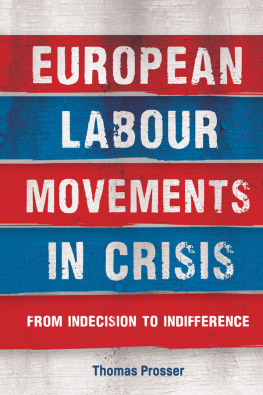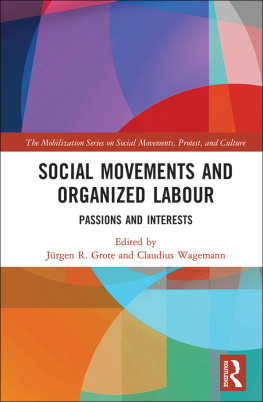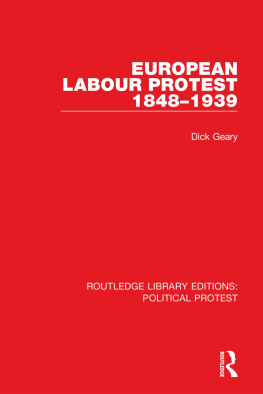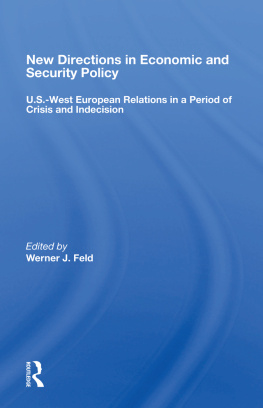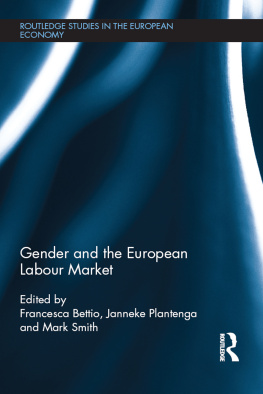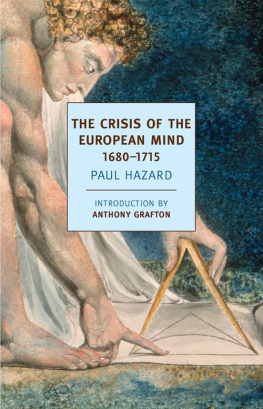European labour movements in crisis
European labour movements in crisis
From indecision to indifference
Thomas Prosser
Manchester University Press
Copyright Thomas Prosser 2019
The right of Thomas Prosser to be identified as the author of this work has been asserted by him in accordance with the Copyright, Designs and Patents Act 1988.
Published by Manchester University Press
Altrincham Street, Manchester M1 7JA
www.manchesteruniversitypress.co.uk
British Library Cataloguing-in-Publication Data
A catalogue record for this book is available from the British Library
ISBN 978 1 5261 3664 0 hardback
First published 2019
The publisher has no responsibility for the persistence or accuracy of URLs for any external or third-party internet websites referred to in this book, and does not guarantee that any content on such websites is, or will remain, accurate or appropriate.
Typeset by Out of House Publishing
Contents
I have tried to make this book as accessible as possible. It is primarily intended for an academic audience, yet I hope that it falls into the hands of policymakers, students and interested laypeople. Particularly with the two latter groups in mind, I have compiled a glossary which is found at the end of the book and elaborates the meaning of key terms and functions of studied organizations. Readers for whom this subject matter is new might consult it as they progress or before they start.
I at least hope that this book is easier to read than it was to write. Colleagues who were veterans of similar projects warned me of the challenges of such an endeavour and, in the years which this work has taken to complete, I have become more than acquainted with various trials. I can at least say that I very much enjoyed writing this book. I have a passion for the topic which I hope is reflected in the text, and the process of research took me to a series of stimulating locations and organizations. Regardless of these satisfactions, I often walked a lonely road. Perhaps it is an improper admission for a Welsh scholar of labour movements to make, but I was often buoyed by the timeless counsel of Sir Winston Churchill: keep buggering on.
The act of buggering on may be a lonely one, yet Churchill himself would doubtless have conceded that it cannot be done without support from others. In this sense, I am grateful to a succession of institutions and people without whom this project would not have been possible. Thanks must go to institutions. Cardiff University has provided a conducive environment for research since I joined in 2011 and Marco Hauptmeier, Ed Heery and Keith Whitfield have been particularly supportive colleagues. In this time, I have also been fortunate enough to complete stays at the Solidarno trade union, Fundacin Primero de Mayo, Carlos III University of Madrid and ETUI and have received warm welcomes.
I am indebted to Tony Mason of Manchester University Press. Tony has believed in this project from the start and was instrumental in securing its publication. Special thanks must go to interviewees. In each of the four countries in which I did fieldwork, I met a series of kind people who intelligently explained to me the positions of their organizations. Interviewed organizations are listed in an appendix, though the need to preserve anonymity prevents me from naming individuals. I hope that this work does justice to the richness of their accounts.
The help of readers of drafts was no less pivotal; it is difficult to convey my gratitude to those who read early versions of this work and made detailed remarks which invariably improved the manuscript. In an order which is merely alphabetical, I thank Colin Crouch, Patrick Emmenegger, Magnus Feldmann, Bob Hanck, Martin Hpner, Paul Marginson, Guglielmo Meardi, Nick Parsons, Vera epanovi, Mateusz Szymaski and Gareth Williams. The comments of anonymous reviewers procured by Manchester University Press also strengthened this work. Miscellaneous acknowledgements must be made. For invaluable assistance with German-language sources, I thank Sven Werner; the chapter on Germany strongly reflects his incisive analysis. Extended conversations with Michael Arghyrou, Barbara Bechter, Romaric Godin, Simon Lightfoot, Aleksandra Maatsch and Torsten Mller elucidated national contexts. Ania Gazka helped with last-minute presentational tasks and Chlo Fortin-Bergeron and Weronika Poliszuk transcribed interviews.
Family members also helped me complete this project. My sister-in-law, Elea Belda Beneyto, provided crucial aid with finer points of Spanish grammar, while my wife, Justyna Prosser, assisted in a similar way with her native Polish. I cannot limit my gratitude to Justyna to a single line; sharing my life with her is a privilege. Thanks should also go to my multi-talented mother, Lesley Prosser, who, aside from making a maiden stand for Parliament while this book was being written, continues to be a proof-reader without peer.
One of the individuals who would have read this work most enthusiastically is alas not around to do so. My father Stephen Prosser was instrumental in encouraging me to enter academia, yet passed away before I had taken many steps down the career path. I dedicate this work to his memory.
Europe lies in long-term torpor. Not only is the continent recovering from a decade-long crisis, but the single currency, hitherto the crown jewel of European integration, has itself been a major cause of malaise. This crisis of Economic and Monetary Union (EMU) has been underpinned by nationalist feuds over economic policy. A core of northern European countries, led by Germany and distinguished by their solvent economies, have become exasperated by the profligacy of southern countries. These periphery countries, ravaged by years of core-imposed austerity, in turn point to the ruinous effects of reforms demanded by the core. The dispute continues to threaten a break-up of the EU. Not only do certain periphery countries remain close to exit from the Eurozone, but the genie of nationalist-populism, unbottled by the tensions of crisis, threatens to tear the EU apart from below.
In this book, I contend that this malaise can partly be located in the response of labour movements to integration. Rather than cooperating with European counterparts so as to maximize joint outcomes, movements rely on national institutions; this instigates zero-sum forms of competition between regimes in different member states, albeit through largely unintentional means. Lack of solidarity during resulting crises reinforces effects of competition. The question of the nature of the reaction of labour to European integration has long preoccupied scholars. Political economists writing after the Maastricht Treaty underlined processes of competition (Rhodes, ).
Owing to recent changes to European integration, specifically the deepening of economic integration and an upturn in nationalism, there is need for an updated approach. My argument is rooted in the study of two key contemporary processes: first, the collective bargaining practices of trade unions in the first decade of the Eurozone (19992010); and, second, the response of trade unions and social-democratic parties to austerity measures in the periphery of the Eurozone (201015). The cases of four countries Germany, Spain, France and Poland are examined. In the first process, national bargaining practices led to divergent economic outcomes. In Germany, an archetypal core member of the Eurozone, agreements were concluded which safeguarded competitiveness vis--vis other member states; this contributed to significant trade imbalances and the outbreak of debt crisis in 2010. In Spain, which was considered a member of the southern European periphery, unions failed to achieve such competitiveness and the country entered crisis. Effects were less stark in other contexts. Though French unions played a limited role in collective bargaining, a state incomes policy ensured a middling level of competitiveness in EMU; France was thus spared the fate of the periphery and may be considered an intermediate case. Non-membership of the Eurozone insulated Poland from these processes, even if de-centralized bargaining structures might have allowed the country to achieve competitiveness within the single currency.


